Overview
A branding story serves as a heartfelt narrative that encapsulates a company's identity, values, and mission. This connection is vital for reaching consumers on an emotional level. Without a compelling branding story, companies risk losing the opportunity to resonate with their audience. The implications of this can be significant, as consumers increasingly seek brands that reflect their own values and experiences.
Effective branding stories weave together elements such as:
- Origin
- Purpose
- Challenges
- Solutions
These stories not only set a brand apart in a competitive market but also foster deep consumer loyalty and influence purchasing decisions. Research indicates that 68% of buyers are swayed by narratives, underscoring the importance of crafting a relatable and engaging story. By embracing the power of storytelling, companies can connect more authentically with their audience, nurturing relationships that lead to lasting loyalty.
Introduction
A compelling branding story is more than just a narrative; it is the heartbeat of a company, encapsulating its identity, values, and mission in a way that resonates with consumers. However, many founders find themselves facing the daunting challenge of crafting a narrative that not only stands out but also fosters loyalty and trust among their audience.
As businesses navigate an increasingly saturated market, the ability to forge emotional connections through storytelling has never been more critical, yet it can feel overwhelming. How can a well-defined branding story transform a company's presence and drive consumer engagement in a world where authenticity is paramount?
The answer lies in understanding that a nurturing approach to storytelling can create those vital connections, allowing your brand to shine amidst the noise.
Define Branding Story: Core Concept and Elements
A brand narrative serves as a captivating account that reflects a company's identity, values, and mission, effectively conveying its essence to the audience. This narrative structure enables companies to express their unique selling propositions and foster emotional bonds with consumers. Many tech startup founders face the challenge of standing out in a crowded marketplace, often feeling overwhelmed by the competition. Without a compelling story, it can be difficult to connect with potential customers on a deeper level.
Key elements of a branding story include:
- Origin: The beginnings of the brand, highlighting its journey and evolution, much like RNO1's transformative approach that shifts from being a vendor to a collaborative partner in digital growth. This evolution is relatable and speaks to the aspirations of many founders.
- Purpose: The core mission that drives the company's actions and decisions, reflecting RNO1's commitment to delivering measurable success through collaborative strategies. This purpose resonates with those seeking meaningful partnerships.
- Challenges: The obstacles the organization has faced, showcasing resilience and adaptability, akin to the challenges encountered during the strategic rebranding of Founder's Haven, which empowers modern founders for digital success. Sharing these challenges can foster a sense of camaraderie among founders who face similar hurdles.
- Solutions: The value and benefits the company provides to its customers, emphasizing RNO1's design-driven solutions that enhance branding and performance marketing strategies. These solutions offer hope and direction for those navigating their own journeys.
This branding story not only sets the entity apart in a crowded marketplace but also fosters a deeper emotional connection with the audience, making it more memorable and relatable. Research suggests that 68% of buyers claim that narratives affect their purchasing choices, and 55% are more inclined to buy a product if they appreciate the narrative. This highlights the significance of a well-crafted tale. Moreover, companies that develop a clear branding story can experience a 2-3 times rise in market share, showcasing the concrete advantages of investing in a compelling narrative. As branding specialist Seth Godin points out, a label is a mix of anticipations, recollections, narratives, and connections that affect buyer decisions. This emphasizes the in establishing equity and loyalty, reinforcing the idea that every founder's story matters.
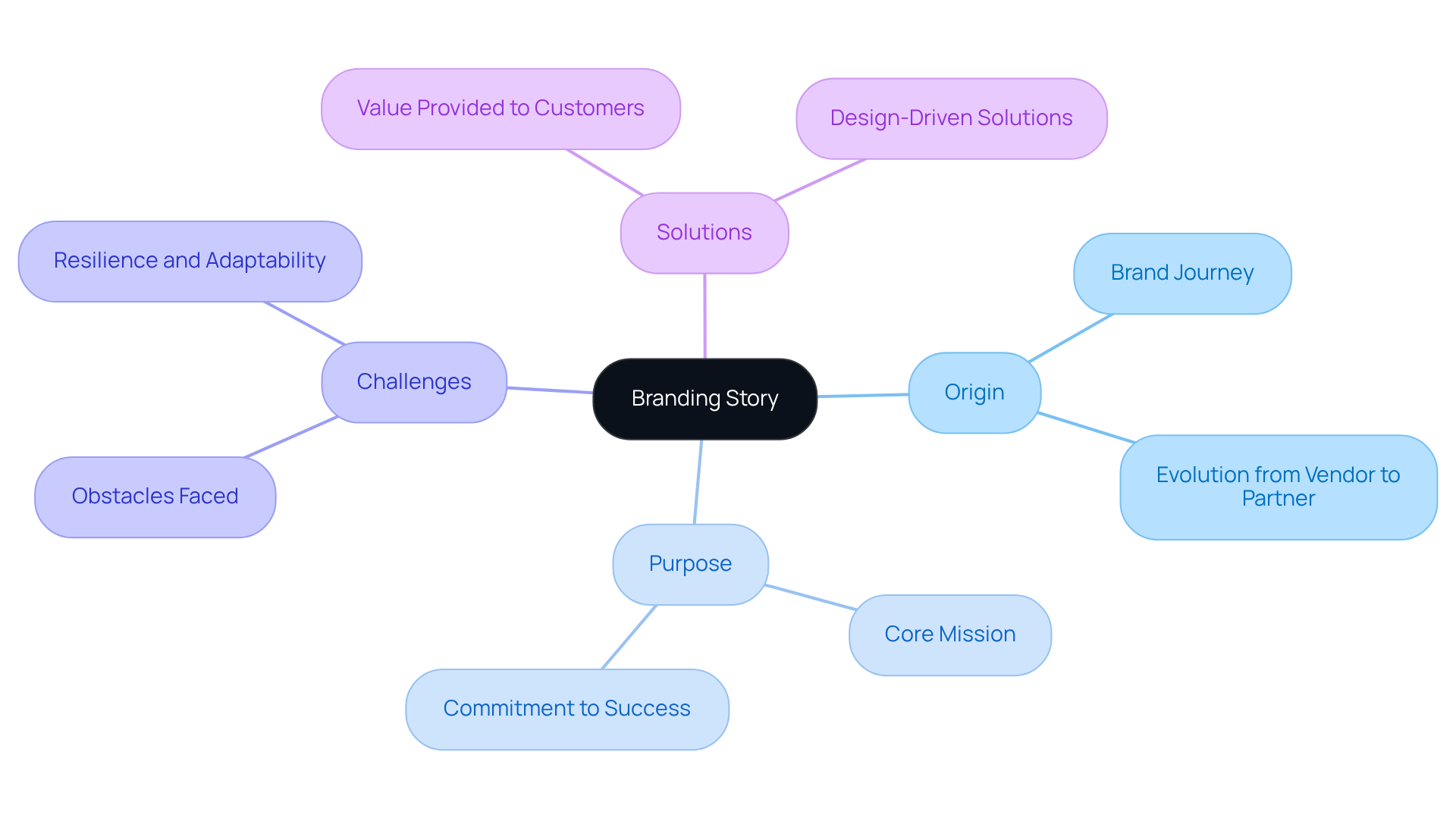
Explore the Evolution of Branding Stories in Marketing
Branding stories have undergone a profound transformation, shifting from straightforward product descriptions to intricate branding stories that resonate with individuals on multiple levels. Initially, marketing leaned heavily on catchy slogans and striking visuals to communicate messages. Yet, as customer expectations evolved towards authenticity and emotional connections, companies began embracing branding stories that truly resonate with their audiences. RNO1's strategic rebranding of Founder's Haven stands as a testament to this evolution, emphasizing the empowerment of modern founders for digital success through a thoughtful case study approach.
Today, an effective branding story often weaves in elements of , community engagement, and personal experiences, reflecting a deep understanding of buyer values. This shift is underscored by data revealing that:
- 75% of consumers believe a branding story is vital in marketing
- 86% prefer companies that demonstrate transparency
Notably, companies like LEGO have harnessed storytelling to create a compelling branding story that enhances customer loyalty and engagement, showcasing how narratives can significantly influence purchasing decisions.
As the landscape continues to change, RNO1's performance marketing expertise becomes crucial for companies aiming to adapt their narratives to stay relevant and impactful. By fostering meaningful connections with their audience, they can ensure that their branding story resonates deeply and authentically.
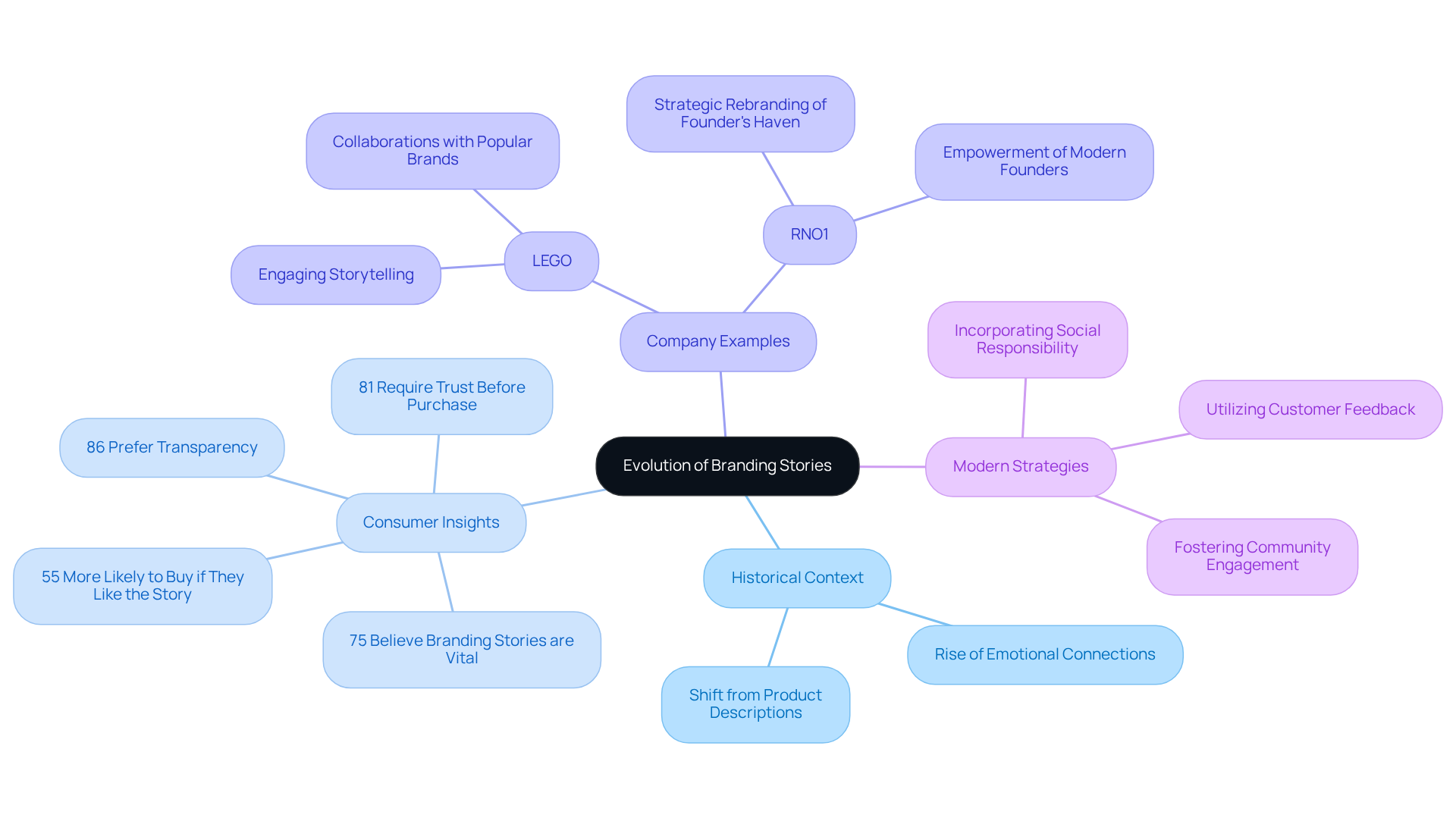
Understand the Importance of Branding Stories in Modern Marketing
In the realm of modern marketing, many founders face the challenge of forging emotional bonds with their consumers. This is vital because a branding story enables companies to express their core values and mission, which in turn fosters trust and loyalty within their audience. An engaging branding story not only differentiates a company from its competitors but also enhances its memorability and relatability.
For example, RNO1's thoughtful rebranding of Founder's Haven illustrates how a focused narrative can empower today's founders in their digital journeys. By addressing the unique challenges that entrepreneurs encounter, RNO1 has crafted a narrative that resonates deeply with its target audience. This case study highlights the power of storytelling in shaping identity, illustrating how RNO1's branding story aims to inspire and engage tech startup founders.
As buyers increasingly prioritize authenticity and purpose in their purchasing decisions, the importance of a well-crafted branding story becomes even more pronounced. Research reveals that 68% of buyers are influenced by narratives when making choices, emphasizing the necessity for companies to develop a branding story that resonates with their audience's experiences and aspirations. Furthermore, emotional narratives can lead to a remarkable 20% increase in customer loyalty, demonstrating their effectiveness in nurturing lasting relationships with consumers.
In a landscape where product differentiation is essential, a strong branding story emerges as a crucial strategy for companies seeking to forge deep connections with their customers. Additionally, individuals are 22 times more likely to remember a branding story-based fact, reinforcing the significance of storytelling in branding. Genuine loyalty, characterized by emotional connections rather than mere rewards, has surged by 26% from 2021 to 2024, emphasizing the need for companies to cultivate these emotional ties with their audience.
As Seth Godin wisely notes, 'a label is the collection of expectations, memories, narratives, and connections that, combined, influence an individual's choice to select one product or service instead of another.' This statement underscores the in shaping a company's identity. Moreover, the substantial rise in searches for 'storytelling marketing,' which experienced a more than threefold increase from September 2023 to September 2024, reflects a growing acknowledgment of storytelling's impact in the marketing landscape. Maintaining a consistent visual identity is also crucial, as 28% of consumers identify it as a significant factor in their loyalty, illustrating how narratives contribute to a cohesive identity.
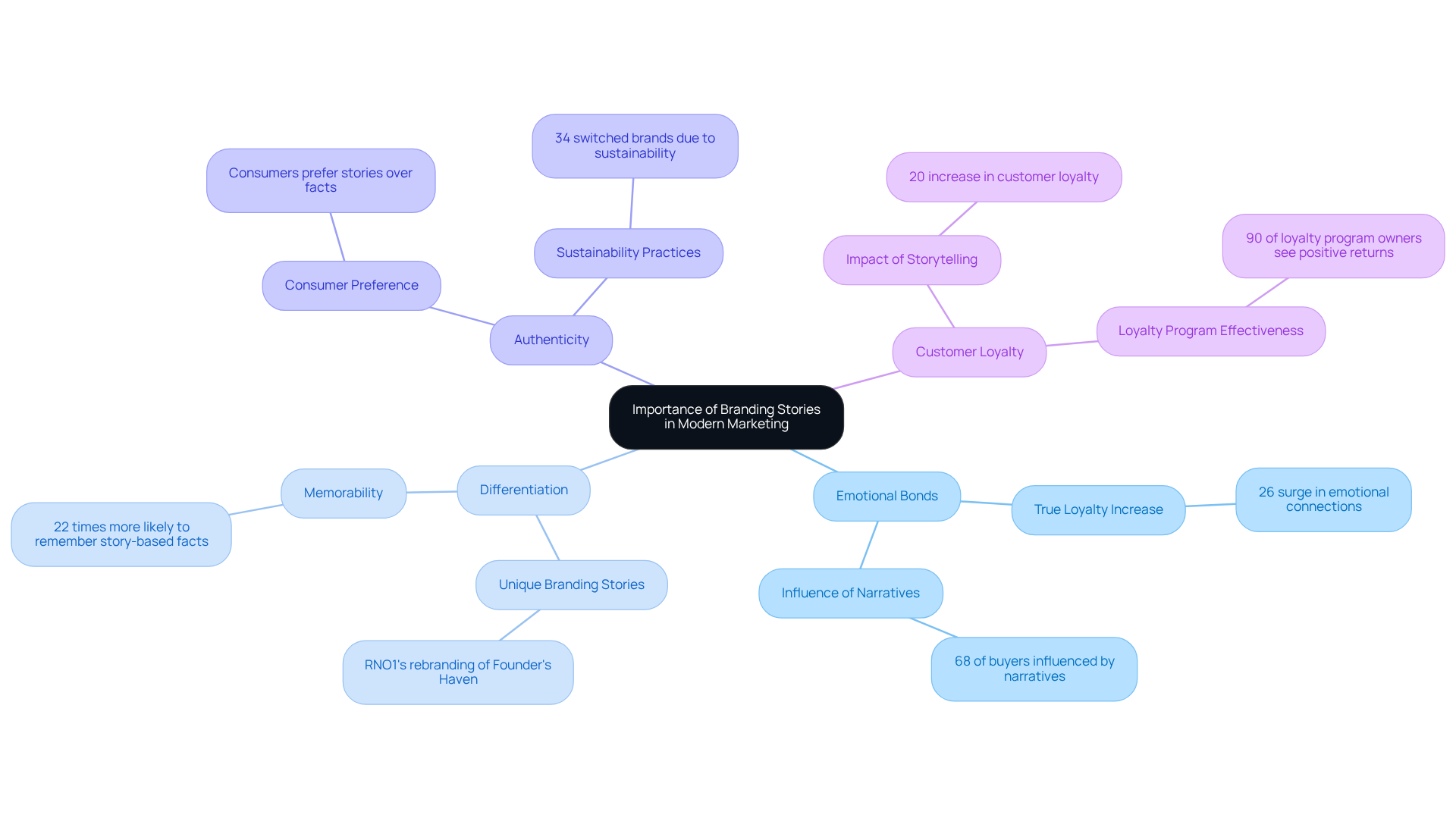
Identify Key Characteristics of Effective Branding Stories
Effective branding stories are defined by several key characteristics that significantly enhance their impact. At the heart of this branding story is authenticity, which ensures that the narrative truly reflects the organization's core values and mission. This authenticity cultivates confidence; in fact, 86% of individuals deem it essential when selecting companies to endorse. Emotional resonance is another critical element of a branding story, allowing brands to connect with their audience's feelings and experiences, which can lead to increased loyalty. Furthermore, relatability enhances this connection, enabling individuals to envision themselves within the branding story, thereby nurturing a sense of belonging.
Consider RNO1's results-driven approach, encapsulated in the phrase 'R is for real results.' This underscores the in the branding story. The organization is dedicated to achieving quantifiable success through cooperative strategies that improve storytelling. Consistency across all marketing channels is crucial for strengthening the identity and message of the organization, making it easier for individuals to recognize and recall the company. Research indicates that consistent branding can contribute to a revenue increase of 10-20%. Moreover, incorporating elements such as conflict and resolution into the branding story can create a compelling narrative arc that captivates the audience and drives engagement. For instance, companies like Nike have successfully utilized storytelling to enhance emotional connections with consumers, demonstrating the power of authentic narratives in fostering loyalty.
By emphasizing these traits and embracing a transformative method such as RNO1's, companies can create a branding story that connects with their audience and promotes long-term success. Let’s explore how you can weave these elements into your own branding journey, creating a story that resonates deeply and drives meaningful connections.
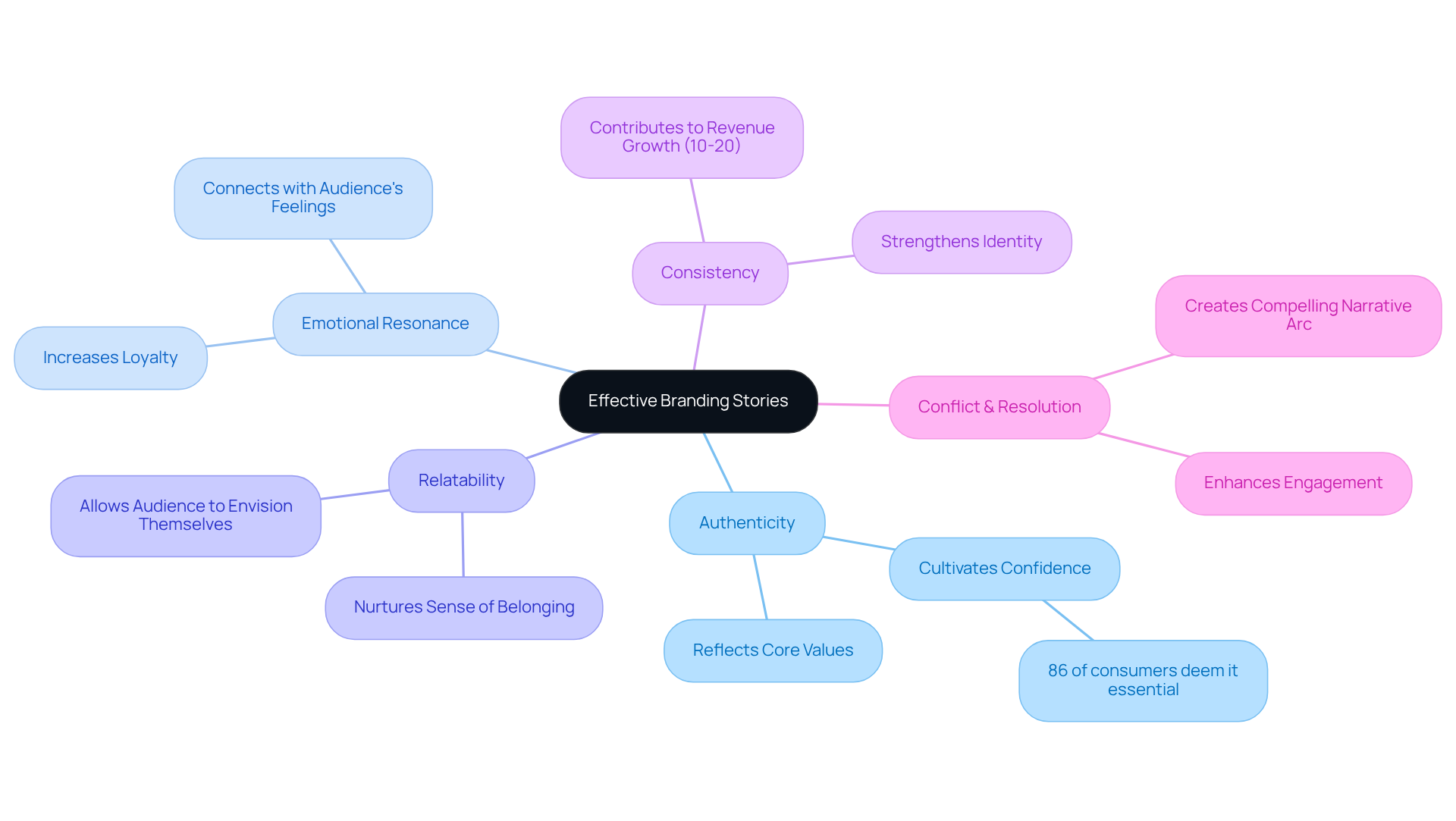
Examples of Successful Branding Stories
Many companies face the challenge of standing out in a crowded market, and a strong branding story offers a powerful solution. For instance, Dove's 'Real Beauty' campaign tells a heartfelt story of self-acceptance and empowerment. This narrative resonates deeply with individuals, fostering a strong emotional connection. As a result, the campaign achieved an impressive 700% sales increase in certain markets within its first year, demonstrating the tangible benefits of a well-crafted story. Additionally, 60% of women reported a positive shift in their perception of beauty due to Dove's inclusive messaging, which celebrates women of all shapes and sizes. Furthermore, 55% of individuals are willing to pay more for brands that promote positive social and environmental impacts, highlighting how Dove's approach cultivates loyalty among consumers.
Similarly, Patagonia weaves its commitment to environmental sustainability into its brand narrative, resonating with eco-conscious consumers and reinforcing its core values. This alignment not only distinguishes Patagonia in a competitive landscape but also nurtures a loyal customer base that shares its mission. Companies that consistently share their stories can see a 20% increase in value, underscoring the power of storytelling in marketing. As one industry leader noted, "Pairing a narrative with a product can enhance its worth by up to 2,706%,” illustrating the profound impact storytelling has on how products are perceived.
These examples showcase how can not only differentiate a brand but also foster lasting connections with consumers, ultimately driving loyalty and sales. By embracing storytelling, companies can forge deeper relationships with their audience, addressing their emotional needs and fostering a sense of community.
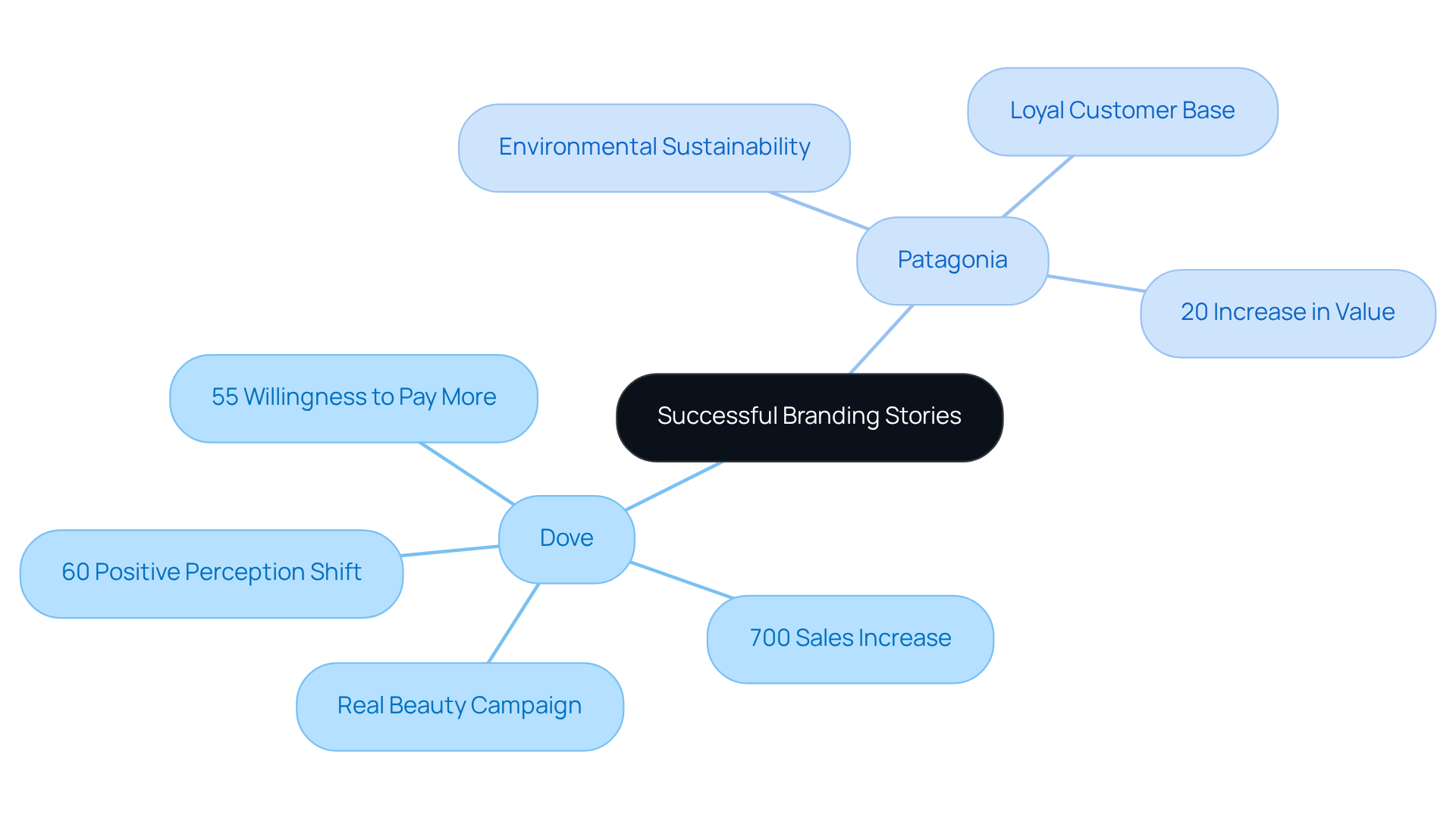
Conclusion
A compelling branding story is not just a narrative; it is the very foundation of a company's identity. It weaves together its origins, purpose, challenges, and solutions into a tale that resonates deeply with consumers. When brands effectively communicate these elements, they not only stand out in competitive markets but also nurture emotional connections that enhance customer loyalty and trust. Research underscores the importance of a well-crafted branding story, revealing that narratives significantly influence purchasing decisions and shape brand perception.
As we reflect on this journey, key insights have emerged, revealing how branding stories have evolved from simple product descriptions to rich narratives that embody authenticity and emotional resonance. Consider the success of campaigns like Dove's "Real Beauty" and Patagonia's commitment to sustainability; these engaging stories have not only driven substantial sales increases but have also cultivated a loyal customer base. The characteristics of effective branding stories—authenticity, relatability, and emotional connection—are vital components that contribute to a brand's long-term success.
In an ever-evolving marketing landscape, embracing the power of storytelling is becoming increasingly essential. We encourage companies to develop unique narratives that reflect their values and mission, resonating deeply with their audience. By doing so, they can cultivate genuine relationships with consumers, ultimately driving brand loyalty and success in a crowded marketplace. Crafting a branding story transcends mere marketing strategy; it is an opportunity to connect, inspire, and create a lasting impact.
Frequently Asked Questions
What is a branding story?
A branding story is a captivating account that reflects a company's identity, values, and mission, effectively conveying its essence to the audience and fostering emotional bonds with consumers.
What are the key elements of a branding story?
The key elements of a branding story include: - Origin: The beginnings and evolution of the brand. - Purpose: The core mission driving the company's actions and decisions. - Challenges: The obstacles the organization has faced, showcasing resilience. - Solutions: The value and benefits the company provides to its customers.
Why is a branding story important for companies?
A branding story helps companies stand out in a crowded marketplace, fosters deeper emotional connections with the audience, and can significantly influence purchasing decisions. Research indicates that 68% of buyers are affected by narratives, and companies with a clear branding story can experience a 2-3 times increase in market share.
How have branding stories evolved in marketing?
Branding stories have evolved from straightforward product descriptions to complex narratives that resonate on multiple levels, emphasizing authenticity and emotional connections. This shift reflects changing customer expectations and the importance of social responsibility and community engagement.
What percentage of consumers believe a branding story is vital in marketing?
75% of consumers believe a branding story is vital in marketing.
What role does transparency play in consumer preferences regarding branding stories?
86% of consumers prefer companies that demonstrate transparency, indicating that authenticity in branding stories is crucial for building trust and engagement.
Can you provide an example of a company that effectively uses storytelling in its branding?
LEGO is an example of a company that has harnessed storytelling to create a compelling branding story, enhancing customer loyalty and engagement through narratives that influence purchasing decisions.




